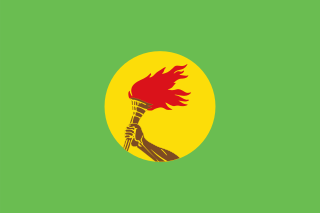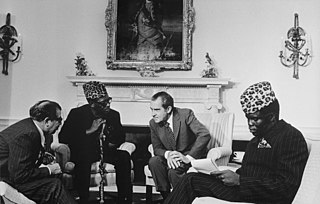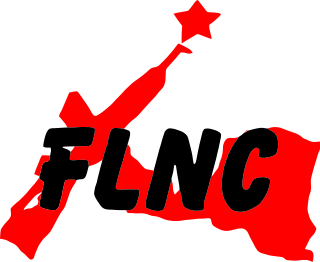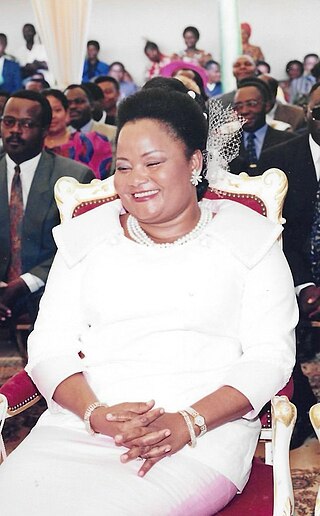
Zaire, officially the Republic of Zaire, was the name of the Democratic Republic of the Congo from 1971 to 18 May 1997. Located in Central Africa, it was, by area, the third-largest country in Africa after Sudan and Algeria, and the 11th-largest country in the world from 1965 to 1997. With a population of over 23 million, Zaire was the most populous Francophone country in Africa. Zaire played a central role during the Cold War.

Mobutu Sese Seko Kuku Ngbendu wa za Banga, often shortened to Mobutu Sese Seko or Mobutu and also known by his initials MSS, was a Congolese politician and military officer who was the 1st and only President of Zaire from 1971 to 1997. Previously, Mobutu served as the 2nd President of the Democratic Republic of the Congo from 1965 to 1971. He also served as the 5th Chairman of the Organisation of African Unity from 1967 to 1968. During the Congo Crisis, Mobutu, serving as Chief of Staff of the Army and supported by Belgium and the United States, deposed the democratically elected government of left-wing nationalist Patrice Lumumba in 1960. Mobutu installed a government that arranged for Lumumba's execution in 1961, and continued to lead the country's armed forces until he took power directly in a second coup in 1965.

Léon Kengo wa Dondo is a Congolese politician who served as the "first state commissioner" several times under Mobutu Sese Seko in Zaïre. He was one of the most powerful figures in the regime and was a strong advocate of economic globalization and free-market economics. He served as President of the Senate of the Democratic Republic of the Congo from 2007 to 2019.

The Alliance of Democratic Forces for the Liberation of Congo-Zaire, also known by the French acronym AFDL, was a coalition of Rwandan, Ugandan, Burundian, and Congolese dissidents, disgruntled minority groups, and nations that toppled Mobutu Sese Seko and brought Laurent-Désiré Kabila to power in the First Congo War. Although the group was successful in overthrowing Mobutu, the alliance fell apart after Kabila did not agree to be dictated by his foreign backers, Rwanda and Uganda, which marked the beginning of the Second Congo War in 1998.

The First Congo War, also known as Africa's First World War, was a civil and international military conflict that lasted from 24 October 1996 to 16 May 1997, primarily taking place in Zaire. The war resulted in the overthrow of Zairean President Mobutu Sese Seko, who was replaced by rebel leader Laurent-Désiré Kabila. This conflict, which also involved multiple neighboring countries, set the stage for the Second Congo War (1998–2003) due to tensions between Kabila and his former allies.

The Popular Movement of the Revolution was the ruling political party in Zaire. For most of its existence, it was the only legally permitted party in the country. It was founded by Joseph-Désiré Mobutu on 20 May 1967.

Nzanga Mobutu is a Congolese politician. A son of the long-time President Mobutu Sese Seko, he served in the government of the Democratic Republic of the Congo from 2007 to 2011, initially as Minister of State for Agriculture and subsequently as Deputy Prime Minister for Basic Social Needs and Deputy Prime Minister for Labor, Employment and Social Security. He received the fourth-highest number of votes in the 2006 presidential election. In 2007, Nzanga founded the Union of Mobutist Democrats as the successor to his father's Popular Movement of the Revolution and has led the party since.
Ndolo Michel Mathieu Kongulu Mobutu, often shortened to Kongolo Mobutu and also known by his nickname Saddam Hussein, was a son of Mobutu Sese Seko, the president of Zaire, and an officer in the Special Presidential Division (DSP).

Authenticité, sometimes Zairisation or Zairianisation in English, was an official state ideology of the regime of Mobutu Sese Seko that originated in the late 1960s and early 1970s in what was first the Democratic Republic of Congo, later renamed Zaire. The authenticity campaign was an effort to rid the country of the lingering vestiges of colonialism and the continuing influence of Western culture and to create a more centralized and singular national identity.

Mobutu Sese Seko's foreign policy emphasized his alliance with the United States and the Western world while supposedly maintaining a non-aligned position in international affairs. Mobutu ruled the Republic of the Congo and then Zaire as president for 32 years, from 1965 to 1997.

The Congolese National Liberation Front was a Congolese left-wing armed opposition group and political party that was founded by rebels of Katangese origin and composed of ex-members of the Katangese Gendarmerie. It was active mainly in Angola and Zaire during the 1970s.

Democratic Republic of the Congo–Russia relations are the bilateral foreign relations between the Democratic Republic of the Congo and Russia. The Democratic Republic of the Congo has an embassy in Moscow and an honorary consulate in Yekaterinburg. Russia has an embassy in Kinshasa. The relations between the two countries were established on July 7, 1960, and restored since November 30, 1967.

Jonas Mukamba Kadiata Nzemba is a politician from the Democratic Republic of the Congo and former CEO of the state-run diamond company. Between August 1965 and October 1968 he was governor in turn of South Kasai, Kasaï-Oriental, Équateur and Orientale Province. He was again governor of Équateur Province between 27 August 1980 and 19 March 1983.

The White Legion was a mercenary unit during the First Congo War (1996–97) employed on the side of Zaire President Mobutu Sese Seko. This group of several hundred men, mostly from former Yugoslavia, was given the task of defending the city of Kisangani and training Zairean troops. This effort was largely unsuccessful and in mid-March 1997 the mercenaries left the country.

Bobi Ladawa Mobutu also known as Mama Bobi Ladawa, is the second wife and widow of Mobutu Sese Seko who ruled Zaire as president between 1965 and 1997.

Étienne Nzimbi Ngbale Kongo wa Bassa, better known as Nzimbi Ngbale, was a Zairean general who served in the Presidential Guard of Mobutu Sese Seko. Ngbale, who was Mobutu's cousin, served as the commander of the Special Presidential Division until the fall of Zaire in 1997.
A number of labour strikes, labour disputes, and other industrial actions occurred in 1991.
In 1997, a number of labour strikes, labour disputes, and other industrial actions occurred.











